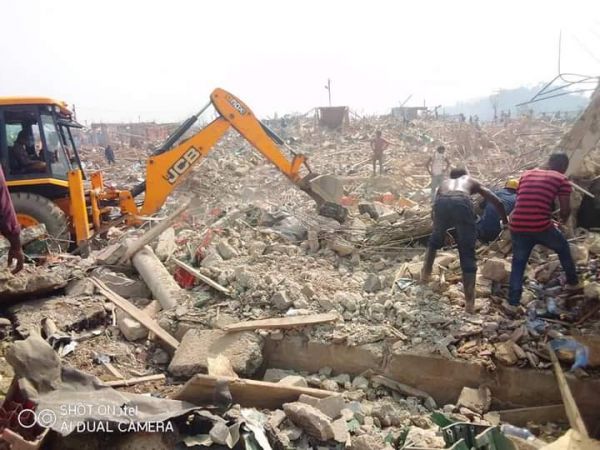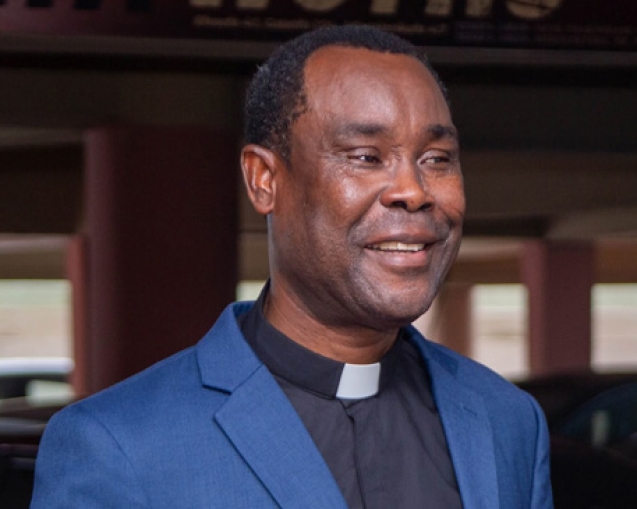The State Housing Company (SHC) has begun an assessment of the damage done to residential structures by the deadly explosion at Appiatse, a small community near Bogoso in the Western Region.
The assessment will provide the company with adequate information to plan the rebuilding exercise, which the government has instructed it to carry out.
Last Saturday, a team from the state-owned building firm moved to the community which was flattened by blasts from 10 tonnes of explosives to evaluate and mark residential, commercial and classroom blocks, shops, churches, among other structures, for construction.
The swift move by the company is in response to the assurance by the Vice-President, Dr Mahamudu Bawumia, that the government would reconstruct the community to bring relief to the people, especially the victims of the blast.
Road reconstruction, engagements
Aside from housing, work has also begun on the reconstruction of the damaged part of the Tarkwa-Asankragua road, which developed a deep opening, to ensure free flow of traffic.
Also, the Minerals Commission has closed down Maxam Ghana, a Ghanaian-Spanish joint company, as part of investigations into the fatal explosion.
The tragic incident, which killed more than 13 people and injured more than 100 others, resulted an accident involving the truck transporting the explosives to a mine at Chirano in the Western North Region and a tricycle at Appiatse, a mining and farming community in the Prestea Huni-Valley municipality in the Western Region, last Thursday.
Assessment
Speaking with the Daily Graphic, the Municipal Chief Executive for Prestea-Huni Valley, Dr Isaac Dasmani, said “after the SHC had carried out its assessment, we have not started disturbing the place because we are waiting for the Environmental Protection Agency (EPA) report to tell us about the toxicity level or otherwise”.
He said the explosives were essentially chemicals and, therefore, “when the EPA is done with its assessment, we will be in a position to hand it over to the SHC and our team at the assembly for the commencement of work”.
“The SHC team was here, as well as a team from the EPA Regional Directorate, and we sat down with them and discussed the way forward. We agreed on what to do, so we are waiting for clearance from the environmental regulators,” Dr Dasmani said.
He said one critical aspect of providing housing for the people was the drawing, which had already begun, explaining that the SHC was working with engineers from the assembly and the Statistical Service.
“This is a very unique community that shares things among themselves – we cannot ignore that. Therefore, we will factor it into the drawings. We are registering the families to ensure that we don’t separate them,” he said.
The MCE said the assembly would also ensure that the reconstruction created enough spaces to open up the community, saying: “We have enough land to create the needed ambiance for the community.”
Accountability
Dr Dasmani said aside from the relief items received, the assembly had received much support from the mining companies.
“I must say we have a lot of goodwill and we’ll ensure that every support in cash or in kind is accounted for and directed towards the benefit of the people,” he said.
Road project
In the quest to ensure the road is open to traffic, the contractor working on the main Tarkwa-Apimanim road has been instructed to move in to save the situation.
The contractor, Gabriel Couto-Rango Consortium, said it would be able to prepare the 100-metre damaged portion of the road for bitumen surfacing within a week.
Mr Nicholas Acheampong, who supervises earthwork, called for the cooperation of motorists using the bypass and members of the affected communities to ensure that they did not intrude.
Solutions
The Western Regional Minister, Mr Kwabena Okyere Darko-Mensah, who visited the community and the project site, commended the team on the ground for its commitment to find temporary and lasting solutions to the unfortunate situation.
He said the RCC was in constant touch with the situation on the ground to ensure that the best care was provided for the people, and that the government would not let them down.
Maxam closed
The Minister for Lands and Natural Resources, Mr Samuel Abu Jinapor, under whose directive the mine was closed, also directed the Chief Executive of the Minerals Commission to interdict the Chief Inspector of Mines and suspend the registration of Maxam, pending the outcome of investigations.
The suspension of Maxam’s registration and operations, was carried out by the Western Regional Manager of the Minerals Commission, Mr Isaac Mwinbelle, on the company’s premises at Iduapriem, near Tarkwa, at exactly 2 p.m. last Saturday.
After reading Regulation Two (2) of the Minerals and Mining Explosive Regulations, 2012 (LI 2177), Mr Mwinbelle signed the closure notice, which was counter-signed by the Maxam Plant Manager, Mr Emerald Takyi, after which the operations were declared closed.
The regional manager explained that the closure was as a result of the explosion of its products which were being transported, adding that although the explosion did not occur at the plant, “the shutting down forms part of the Minerals and Mining Regulations (LI 2182), which looks at health and safety regulations”.
“Let me emphasise that we are not here to pronounce judgement on the company and its operations. We are here just for the enforcement of the regulation, which requires the closure of the facility,” Mr Mwinbelle said.
He said in spite of the fact that the explosion did not happen at the plant, the factory was the source of the explosive products, adding: “This is where they are manufactured and transported to various mining sites.”
Concerns
Senior employees of some large-scale mining companies have expressed concern about the closure of Maxam because it would have serious consequences on their operations.
This is because the company supplies about 40 per cent of the explosives used in the industry in the country and other West African countries.
Source: Graphic.com.gh


















